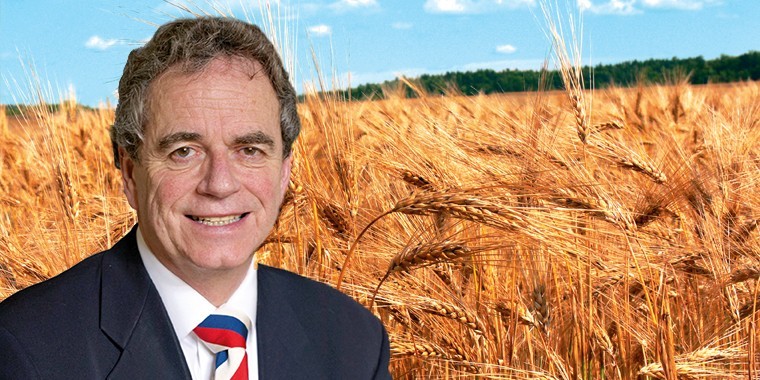The UK supply and demand on wheat will get tighter as we progress through the new year: some estimate that one million tonnes of wheat will have been exported by Christmas.
If it’s true, there would only be about half a million tonnes to dispose of between January and June 17. We have had three to four record years of production around the world – so much so that France can lose 12 million tonnes from its wheat harvest and we hardly notice.
I said last month that we must avoid being complacent because the UK has only a small exportable wheat surplus left. I can recall years when, because we only had a small surplus, we forget to sell it or cheap imports appeared changing the small to a larger surplus and prices fell away before the next harvest.
Make no mistake there is plenty of rubbish feed wheat in France which could find its way into Ireland or Scotland; and there is plenty of good quality wheat that could come in from the Baltic states. I have said consistently since Brexit that the only real game changer is currency. With the accumulation of three to four world record harvests of wheat and maize, there is nothing in the fundamental world supply and demand that is a game changer, so currency is king and rules OK.
You would need a loss of something like 100 million tonnes of wheat or maize to change world market values. Ironically, the very poor quality of other countries’ wheat – e.g. France – has meant that almost all of our milling and biscuit varieties are worth a premium. In fact its difficult to find any UK grower who admits to having any feed wheat at all.
So given my opinion – which is that currency post Brexit is the only real game changer for the grain market – how could that play out? Well, there has been a lot of talk about either a hard or soft Brexit landing. A soft landing should be better for sterling and the UK economy, whereas a hard landing looks like bad news. I think we may see a parachute assisted softer landing. Neither the Bank of England nor the UK government want the inevitable side effect of weak sterling, which is inflation, caused by expensive imports of staple commodities like food and oil.
So what can they do to strengthen sterling? Well the Bank of England, however unlikely it maybe, could raise interest rates: even one eighth of one per cent would be sufficient. The government, having allowed themselves to be pushed into setting out a rough timetable for the Brexit process to formally begin, could row back from the March 2017 date – possibly because they are being pressed to declare precisely what their negotiating position will be regarding the key issues of free trade and migration. That is nonsense, as no one could be expected to declare their final bargaining position before the process starts. So my guess is that the start date for article 50 will be delayed.
Lastly, I hold the view that the loss of the UK from the European Union is far more potentially damaging to the European economy and the euro than it is to us. The movement of our stock market compared to others in the EU seems to back up my view. Therefore the intrinsically weak euro will fall against sterling.
As fanciful as this may seem, it’s all possible. So, if our wheat market is so dependant on this not happening, why would you take the risk of not selling wheat at £130 for 2016/17/18?
The effect on oilseed rape is even more dramatic and while some of the £70 rise since Brexit is lack of supply, most of that is currency. You can add malting barley also, which has large export premiums for the next two to three years. The only crop which has not gained any benefit from Brexit yet, is feed barley.
Sometimes we have to remind farmers what it felt like when over the past three years forward prices of £130 were turned down only to find that a big crop reduced the post harvest value to only £100.
So, my advice remains unchanged: we have a once in a lifetime market opportunity which is the envy of the rest of the world where grain prices haven’t increased at all: it has to be taken.




